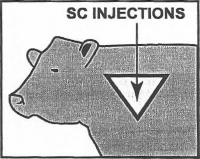Anthrax Spore Vaccine (Canada)
This page contains information on Anthrax Spore Vaccine for veterinary use.The information provided typically includes the following:
- Anthrax Spore Vaccine Indications
- Warnings and cautions for Anthrax Spore Vaccine
- Direction and dosage information for Anthrax Spore Vaccine
Anthrax Spore Vaccine
This treatment applies to the following species:Nonencapsulated Live Culture
GENERAL INFORMATION: This product has been shown to be effective for the vaccination of healthy cattle, sheep, goats, swine, and horses against Anthrax.
This product was licensed prior to the requirement to establish a minimum age for use. The duration of immunity is unknown. For more information regarding efficacy and safety data, see productdata.aphis.usda.gov.
Anthrax Spore Vaccine is prepared from a non-pathogenic, nonencapsulated variant strain of B. anthracis. This vaccine strain is the Sterne Strain 34F2. This vaccine is a suspension of viable Bacillus anthracis spores in Saponin. It is tested for purity, identity, dissociation, spore count, and safety prior to release for sale.
Anthrax is caused by Bacillus anthracis. It is highly virulent, and once access to the animal’s body is achieved, it multiplies quickly, invades the blood stream and produces a rapidly fatal blood infection. Symptoms of anthrax vary according to the species of animal and the magnitude of the attack. The average period of incubation ranges from 24 hours to as much as 5 days or more. The acute form, most common in cattle, sheep and goats is characterized by its sudden onset and rapidly fatal course. Affected animals may present with sudden staggering, difficult respiration, trembling, collapse with convulsive movements and death, which may also occur without evidence of illness. Swelling sometimes appears in different parts of the body, such as the throat and tongue, particularly in affected swine. Upon or near death, blood may ooze from body openings.
In the presence of oxygen, the bacilli form spores which are remarkably tenacious, highly resistant to heat, low temperatures and chemical disinfectants, retaining viability for many years in both soil and water and on hides or contaminated objects held in storage. Animals of all species are susceptible to anthrax to some degree. Cattle, horses, sheep and goats are those most frequently affected. Swine apparently possess some natural resistance but anthrax does occasionally appear in them. Dogs, cats and wild animals may become infected under some conditions. Mice and guinea pigs are highly susceptible.
For control of outbreaks, vaccination of all animals not showing symptoms is recommended. Not all animals will be protected by this procedure, but taking action as suggested may stop further spread of the disease. It is also recommended that animals showing symptoms be isolated and treated with antibiotics as permitted.
Directions For Use
Do not vaccinate within 42 days before slaughter. Shake well before use. Store at 2° to 8° C. Do not freeze. Do not mix with other products. Use entire contents when first opened. Do not use disinfectants to sterilize equipment. Safety in pregnant animals is unknown.
DOSAGE & ADMINISTRATION: Recommended dose is 1.0 ml subcutaneously. Revaccinate in 2-3 weeks in heavily contaminated areas. Historically, annual vaccination is recommended. Contact veterinarian for advice.
The region of the neck just in front of the shoulder is a convenient site for administering the vaccine to cattle and swine. Sheep and goats should be vaccinated subcutaneously on their side (mid-thorax) halfway between the front and back legs. Horses may be vaccinated subcutaneously in the middle portion of the neck or in the brisket at a time when the animals are not being heavily worked.

A light to moderate swelling may appear at the site of injection.
Precautions
Anaphylactoid reaction may occur following administration of products of this nature. If noted, administer adrenalin or equivalent. Adverse reactions have been reported in young and miniature horses. Consult your veterinarian when considering vaccination of exotic or sensitive species and immunologically immature or stressed animals. Animals being vaccinated or recently vaccinated should not receive antibiotics, as antibiotics will interfere with effective vaccination.Inactivate unused contents before disposal.
In case of human exposure, consult a physician.
Conveniently packaged in 10 dose and 50 dose sizes.
FOR VETERINARY USE ONLY
VLN: 188 / PCN: 1011.00
COLORADO SERUM COMPANY, 4950 York Street, Denver, Colorado 80216
303-295-7527
www.colorado-serum.com
THE PEAK OF QUALITY Since 1923
|
|
|
Order # |
|
10 ml |
10 doses |
19102 |
|
50 ml |
50 doses |
19104 |
CPN: 1174002.3
4950 YORK STREET, P.O. BOX 16428-0428, DENVER, CO, 80216-0428
| Telephone: | 303-295-7527 | |
| Order Desk: | 800-525-2065 | |
| Fax: | 303-295-1923 | |
| Website: | www.colorado-serum.com | |
| Email: | colorado-serum@colorado-serum.com |
 |
THIS SERVICE AND DATA ARE PROVIDED "AS IS". Animalytix assumes no liability, and each user assumes full risk, responsibility, and liability, related to its use of the Animalytix service and data. See the Terms of Use for further details. |
Copyright © 2024 Animalytix LLC. Updated: 2024-02-27
